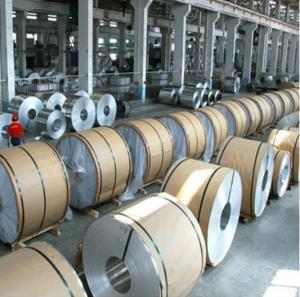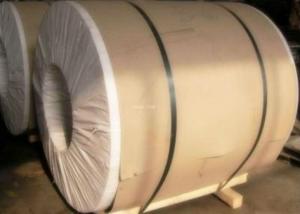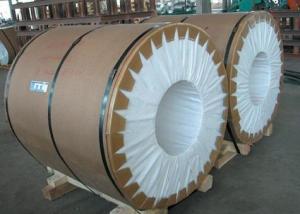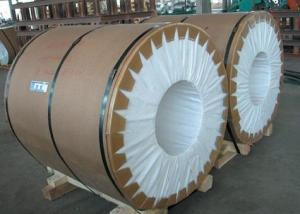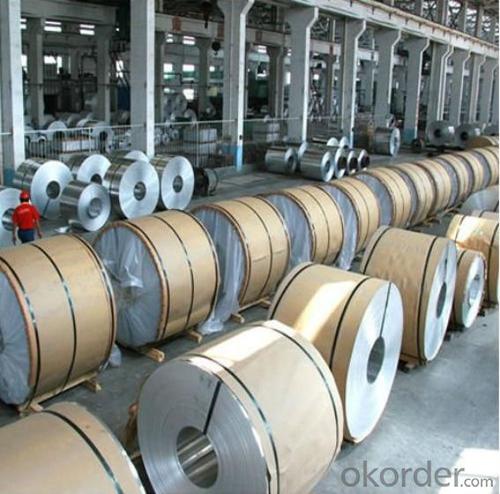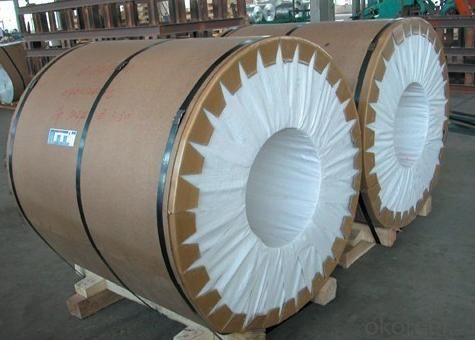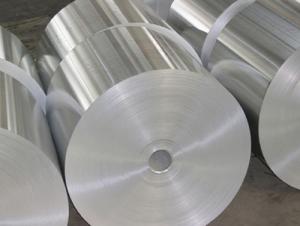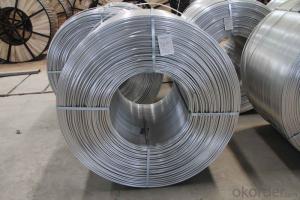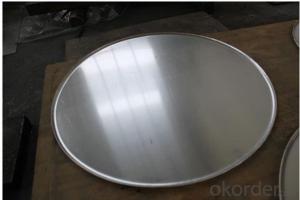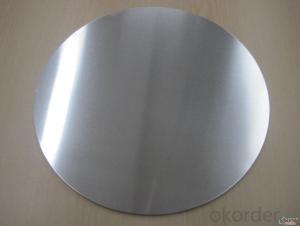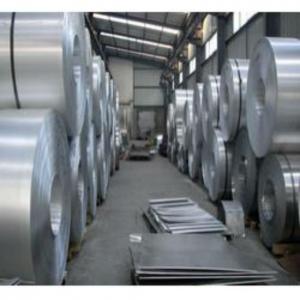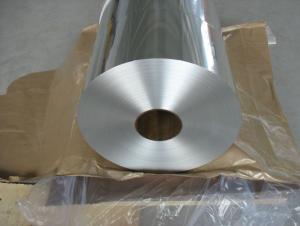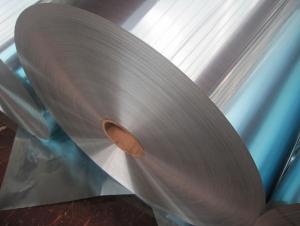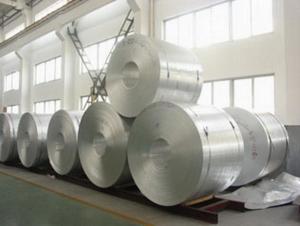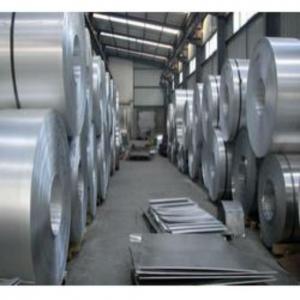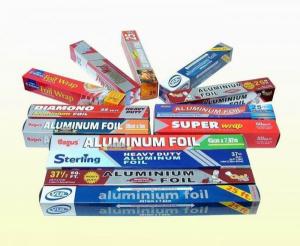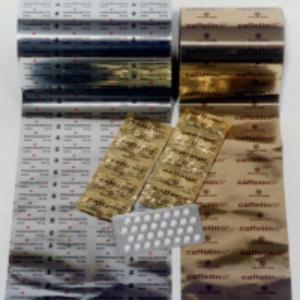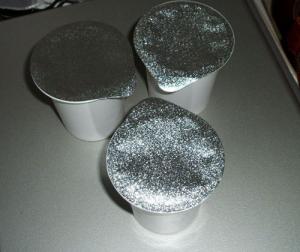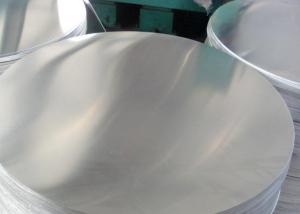Aluminum Container Foilstock
- Loading Port:
- China Main Port
- Payment Terms:
- TT or LC
- Min Order Qty:
- 20Tons m.t.
- Supply Capability:
- 10000Tons Per Month m.t./month
OKorder Service Pledge
OKorder Financial Service
You Might Also Like
Quick details of Aluminum Foilstock For Container Foil
Alloy: 8011/3003
Temper: H14/H16/H24/H26
Specifications of Aluminum Foilstock For Container Foil
Thickness & Tolerance: 0.28 mm - 0.3 mm (+/-0.01 mm)
Width & Tolerance: 1000-2020mm (+/-1 mm)
Core I.D: 405/505/508mm
Surface Quality: good appearance with no-crack and well-distribute grain.
Build Up: tight slit edges free from cracks, layer to layer shift not more than 2 mm.
Profile: -0/+1%
Flatness: mill flatness coil having slight edge waviness rather than center buckles shall be acceptable
Rolling Performance: re-rollable to the final desired gauges
Standard: GB/T3198/ASTM-B209
Usage/Application of Aluminum Foilstock For Container Foil
The aluminium foil stock for final rolling gauges down to min 6 micron
Packaging & Delivery of Aluminum Foilstock For Container Foil
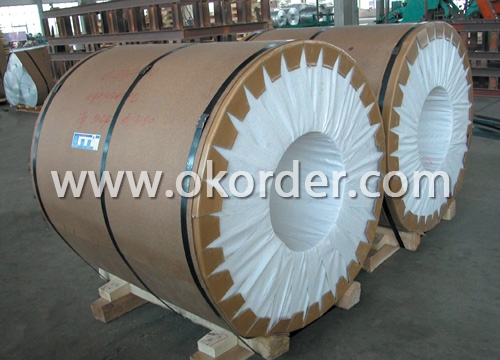
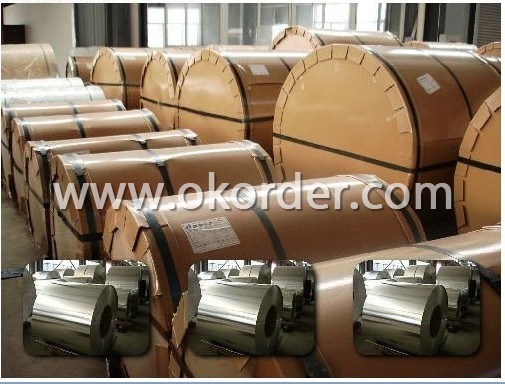
- Q: How can we improve the efficiency and effectiveness of aluminum recycling?
- <p>Yes, there are several ways to recycle aluminum more efficiently and effectively. First, increase consumer awareness about the benefits of recycling aluminum and the importance of proper sorting. Second, invest in advanced recycling technologies that can process aluminum more quickly and with less waste. Third, collaborate with manufacturers to design products that are easier to recycle and made from more recycled content. Lastly, improve collection systems to ensure a higher percentage of aluminum waste is captured and recycled. These steps can significantly boost aluminum recycling rates and sustainability.</p>
- Q: This question asks about the various applications of aluminum in the construction industry.
- <p>Aluminum is widely used in construction due to its lightweight, high strength, and corrosion resistance. It is commonly used in window frames, door frames, curtain walls, and roofing systems for its durability and energy efficiency. Aluminum is also utilized in structural components such as beams and columns, as well as in the manufacturing of prefabricated buildings. Additionally, it is used in the electrical wiring and conduits within buildings due to its excellent conductivity. Its versatility makes it a popular choice for both residential and commercial construction projects.</p>
- Q: This question asks for everyday applications of aluminum foil.
- <p>Aluminum foil has various uses in daily life. It's commonly used for food storage, wrapping leftovers to keep them fresh. It's also used in cooking, such as covering dishes to retain moisture or creating packets for steaming foods. Aluminum foil is great for lining baking sheets to prevent sticking and making cleanup easier. It's also used for insulation, like wrapping pipes to reduce heat loss. Additionally, it's used for arts and crafts, shining surfaces, and even as a makeshift reflector for sunlight. Its versatility makes aluminum foil a staple in many households.</p>
- Q: Is it possible to utilize recycled aluminum in the construction of buildings?
- <p>Yes, recycled aluminum can be used for building materials. It is commonly used in various construction applications due to its strength, durability, and lightweight properties. Recycled aluminum is not only environmentally friendly but also cost-effective compared to newly mined aluminum. It is used in the production of aluminum windows, doors, roofing materials, and structural components. Additionally, its recyclability reduces waste and conserves natural resources.</p>
- Q: Can the recycling of aluminum be done in a closed loop system without any degradation in the material's quality?
- <p>Yes, aluminum can be recycled using a closed loop process without losing quality. Aluminum is infinitely recyclable, meaning it can be recycled over and over again without losing its properties. The recycling process involves melting the aluminum, which is much less energy-intensive than the original production from raw materials. This closed-loop recycling system helps maintain the quality of aluminum, making it an environmentally friendly and sustainable material.</p>
- Q: Is it possible to utilize aluminum in the manufacturing of tools and equipment?
- <p>Yes, aluminum can be used to make tools and equipment. It is valued for its lightweight, corrosion resistance, and high strength-to-weight ratio. Aluminum is commonly used in various applications such as aircraft manufacturing, automotive parts, and consumer electronics. It is also used in the construction of certain types of tools, particularly those that require lightness and durability without the need for extreme strength. However, for applications requiring high strength or resistance to high temperatures, other materials might be more suitable.</p>
- Q: Is there a link between aluminum exposure and the development of dementia?
- <p>Aluminum has been a subject of concern regarding its potential link to dementia, particularly Alzheimer's disease. However, current scientific consensus indicates that there is no conclusive evidence to support the claim that aluminum causes dementia. Extensive research has been conducted, and the majority of studies have not found a direct causal relationship between aluminum exposure and the development of Alzheimer's or other forms of dementia. While aluminum is naturally present in the environment and can be found in some foods, water, and medications, the body typically does not absorb significant amounts, and any absorbed aluminum is usually efficiently excreted. It is important to continue monitoring scientific research for any new findings, but as of now, aluminum is not considered a proven cause of dementia.</p>
- Q: Is it safe to use aluminum containers for food and drink in a microwave?
- <p>Aluminum is not recommended for use in microwave-safe containers for food and drink. While some aluminum containers are designed to be microwave-safe, they are typically coated with a non-metallic material to prevent arcing and damage to the microwave. However, most aluminum containers are not safe for microwave use as they can cause sparks and potentially damage the microwave. It's best to use microwave-safe plastics, glass, or ceramics specifically designed for microwave use.</p>
- Q: Explain the various applications of aluminum in the construction industry.
- <p>Aluminum is widely used in building materials due to its lightweight, high strength, and corrosion resistance. It's utilized in window frames, doors, curtain walls, and roofing systems for its durability and energy efficiency. Aluminum's malleability allows it to be shaped into various forms, making it ideal for facades and decorative elements. It's also used in structural components like beams and columns, and in electrical wiring due to its excellent conductivity. Additionally, aluminum's sustainability makes it a preferred choice in green building practices, as it's recyclable and has a low environmental impact.</p>
- Q: Dangemen mills and other Aluminum Alloy and enterprises what is the difference?
- Other aluminium door enterprises cover many other products. This can be said to be the most obvious difference Dangemen factory and other enterprises.
Send your message to us
Aluminum Container Foilstock
- Loading Port:
- China Main Port
- Payment Terms:
- TT or LC
- Min Order Qty:
- 20Tons m.t.
- Supply Capability:
- 10000Tons Per Month m.t./month
OKorder Service Pledge
OKorder Financial Service
Similar products
Hot products
Hot Searches
Related keywords
